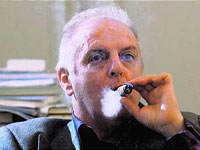Daniel Barenboim to make debut in La Scala
Daniel Barenboim plans to make his debut as La Scala's principal visiting conductor with his gala premiere of "Tristan und Isolde" on Friday night.

Opening the season with Wagner on Verdi turf might seem a provocation, but Barenboim's six-season arrangement with La Scala will be an exercise in cross fertilizing Italian and German operatic traditions as he shuttles between Milan and Berlin, where he is the Staatsoper's music director.
"It is not an act of globalization but it is an act of cosmopolitan thinking," the celebrated conductor and pianist told The Associated Press in a backstage interview between rehearsals.
This season, Barenboim will conduct "Tristan" and the 20th century Russian composer Sergei Prokofiev's treatment of Dostoevsky's "The Gambler," as well as perform the Beethoven piano sonatas. The mixing of styles will culminate with a major co-production by La Scala and the Staatsoper of Wagner's Ring Cycle in 2010-11.
"I think this is especially interesting for works that are very closely associated with one or the other theaters or one or the other countries," Barenboim said. "In other words, to do the Ring here ... gives obviously something very special to La Scala. Whereas to do Simone Boccanegra, Verdi, gives something special to Berlin."
In fact, Wagner is not entirely foreign to La Scala's tiered balconies.
His works are second only to Verdi in opening La Scala's seasons: 17 times dating from the 1889 performance of "Die Meistersinger von Nuernberg" to 1998's "Goetterdaemmerung."
"Tristan," however, has not been among them.
"Of all the Wagner operas, 'Tristan' is the one opera that Wagner-haters like, even those who find the Ring intolerable, too Germanic, or whatever it is. All the anti-Wagnerians recognize 'Tristan' as part of the great works of the repertoire," Barenboim said.
One might easily suppose Barenboim was behind Wagner's prominent return to La Scala, where the German composer's work went silent for a half-century from 1932 largely because of the stigma cast on him by the fact he was Hitler's favorite composer.
The Argentine-born Jewish conductor advocates separating Wagner's glorious music from the taint of Nazi admiration - he has flouted an informal ban on Wagner in his adopted Israel.
But Barenboim says it was La Scala manager Stephane Lissner -following the orchestra mutiny that led to Riccardo Muti's 2005 departure -ho lured Barenboim to La Scala with the prospect of fulfilling one of his dream Wagner projects.
Lissner "knew that if he offered me 'Tristan' with (theater director) Patrice Chereau I could never say no, because this is something Patrice and I have been trying to do together for the last 26 years. And it had been canceled twice, in Bayreuth."
No musical director has been named in Muti's place. Rather, Barenboim is chief among the guest conductors, including Daniele Gatti and Riccardo Chailly. The position is deliberately hazy, with Barenboim carrying the informal honorific title "Maestro of La Scala."
Puffing a cigar in his backstage rehearsal room, Barenboim insistently fends off any suggestion he has a "job" at La Scala.
"I don't have a job," he said, laughing. "Stop saying that."
"I have no duties, responsibilities, rights, of any kind, except the responsibility to make music as best as I can," Barenboim said.
Barenboim said he had an instant chemistry with the La Scala orchestra - which became evident to both sides two years ago when he returned to opera house after a 30-year absence. He praises its musicians for their curiosity.
"This applies as much to the music they don't know, which will be the case with 'Tristan' ... as it does for the Verdi 'Requiem,"' he said. "I never felt for one second, 'well you know, the Verdi Requiem we have played this thousands of times, we just play it.' No to the contrary."
He also knows La Scala's audiences can be savage in their search for purity - particularly those who frequent the upper tiers of La Scala's balconies known as the "loggionisti." Last year, their boos drove tenor Roberto Alagna from the stage during "Aida."
This year, British tenor Ian Storey as "Tristan" and German mezzo-soprano Waltraud Meier as "Isolde" will be put to the test.
"Audiences of La Scala react differently to 'Aida' than an audience in the Staatsoper in Berlin. No question about it," Barenboim said.
"I think in Germany they would be much more tolerant of a slight vocal deficiency if the expression was there. And in Italy they would be a lot more tolerant for lack of expression if the beauty of the tone was there."
Subscribe to Pravda.Ru Telegram channel, Facebook, RSS!


